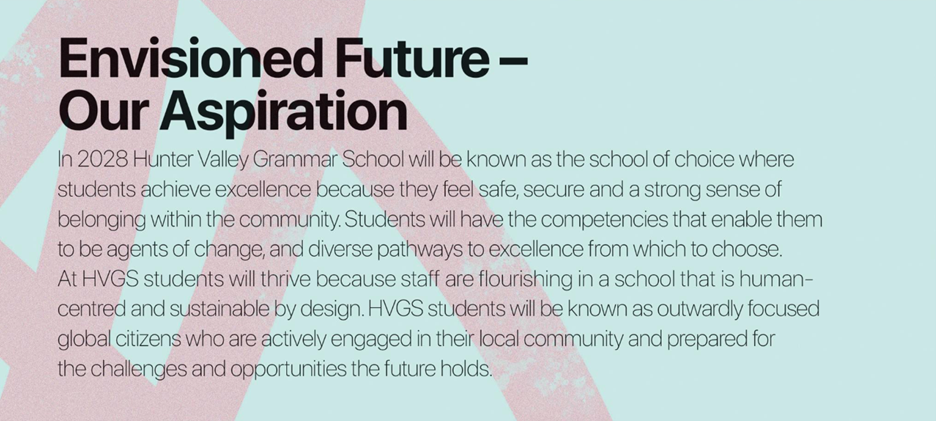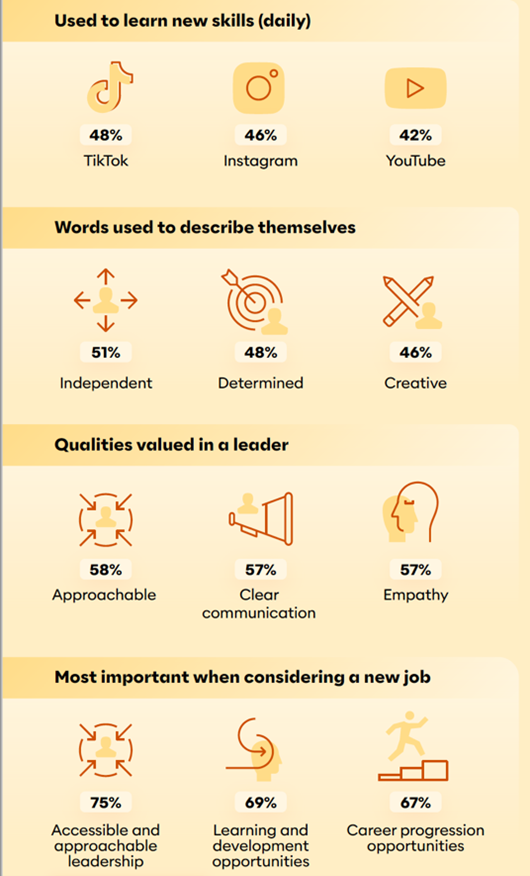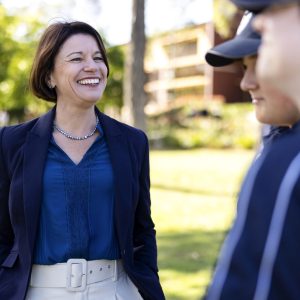Published on November 3, 2023
Wednesday, 1 November was our last Open Morning of the year. This is an opportunity for prospective parents and students to visit HVGS, hear from myself and, more importantly, from our students as they conduct tours. Invariably, the feedback is positive about our students. Their care for, and commitment to, the School is readily apparent and they are incredible at dealing with curly questions!
On these Open Mornings I speak to what is special about HVGS and below are some key points that I share:
- We have a vision for the future that is agile.
- We know that students rise to a challenge when expectations are high, and they are supported to develop competence and mastery in areas which are important to them and/or which will set them up for success in the future.
- We believe that our students can be agents of social and cultural change and go beyond teaching content to help them develop the competencies to do just this.
- We believe strongly that in a hyper connected world where social media has become a “source of truth”, students must leave school with the capacity to think critically, and be creative and resilient. Our students need to interrogate their own and others’ assumptions and learn to work with those who are different to create a better and more peaceful world.
- We are a co-educational, non-selective and secular school which means we are welcoming of all faiths and focus equally on supporting all our young people with achieving the excellence of which they are capable.
- We cultivate a culture of excellence and belonging – our strategic plan has a dual focus on excellence in education and inclusion and belonging.
- We have a calm, welcoming and values-driven environment. When you arrive through our Norfolk Street entrance the first thing you see are our pencils: our values are front and centre. Equally, you see the green, open environment. Our students are not crowded on campus and have the space to move and be.
When I share this with prospective parents, I feel a renewed sense of excitement for who we are here at HVGS and what we stand for. This belief in their power of our community is capture in our strategic statement of our “Envisioned Future”:

As part of my presentation I also share an example of a high-achieving student and our strong HSC and ATAR results. However, they are deliberately not my focus.
Instead, I focus on the fact that we have responsibility to help our young people develop a strong character, ethical compass, and capacity for agility in a rapidly changing world. If our focus was solely on academic grades, we would miss the mark and not fulfil our fundamental responsibility as a learning organisation to educate for the future.
In addition, if I was simply to expect our students to experience what I did as a student in the 1980s, I would definitely be missing the mark! Their lived experience, and expectations for the future, are different to ours at the same age. Therefore, their learning should look and feel different. What they learn should be evolving to be more reflective of contemporary knowledge systems, and how they learn should leverage their current competencies and skill sets as well as help them learn new ones. Consider how often as a parent you may have wondered the following (or even spoken it out loud): “if it was good enough for me, it is good enough for them!”
Actually, it is not; we shouldn’t expect our children to have the same learning experience as ourselves, because they belong to a different generation.
McCrindle recently produced an interesting infographic on Generation Z. According to McCrindle, Generation Z was born between 1995 and 2009. This group represents university and school-age students (Year 8 – 12). The McCrindle article also describes this generation as the “connected” or “dot com” kids, with one in two predicted to obtain a university degree. Generation Z will also comprise 27% of the workforce by 2025. They are predicated to work 18 jobs across six careers and live in 15 homes in their lifetime.

Above is part of the McCrindle Infographic. This group learn new skills daily, value human-centered leadership as well as empathy and creativity. The overall characteristics of this generation are digital, global, social, mobile and visual. Apparently, this generation is more inclined to watch a video than read an article and are deeply social because they are hyper connected through social media.
I share this because as we look at emerging generations, and how best to equip them for the future, we need a different frame of reference to our own lived experience. We don’t belong to their generation and while we have words of wisdom to share, the “what” and “how” of learning should be different for the generations who come through the school.
What we must remain true to, though, is the importance of embracing difference and looking for points of connection so we can work together to solve complex problems. Likewise, we need a concept of excellence that takes into account individual differences and strong communities of connection and belonging. We need learning programmes that cultivate critical thinking and robust (but respectful) debate focused on fact not assumption. We need to provide our learners with the beauty of nature so they are inspired to protect and nurture it, and each other, and we need our young people to develop the competencies to create change. In a complex world they need to understand where their agency lies and leverage it in productive and ethical ways.
This is the HVGS difference: we are a school that believes all this is possible. That we can keep growing and evolving to meet the needs of a generation very different to ours and a future that is both exciting and disconcertingly uncertain.

